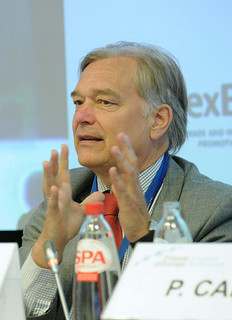Claudia Ciobanu interviews KARL FALKENBERG, head EU negotiator at Rio+20
RIO DE JANEIRO, Jun 21 (TerraViva) The European Union considers the Rio+20 final document as imperfect, but a good starting point for further work.

Karl Falkenberg, European Commission Director General for the Environment. Credit: Laurent Achedjian/Friends of Europe
Terraviva spoke to the EU’s lead negotiator in Rio, Karl Falkenberg, who is also director general for environment in the European Commission.
Excerpts from the interview follow.
Q: How do you find the final document presented by Brazil?
A: I think it’s a good document. It’s not a document that reflects completely the EU’s ambitions, but we understand that we have to make compromises and reflect in the document common positions. But very good messages are highlighted in those common positions, such as that if we want to successfully eradicate poverty, we have to do it by sustainable development, green economy, and creating decent jobs in line with the environmental limits of this planet.
In order to get there, we have described a number of concrete actions in various areas such as water, land use, energy, oceans, sustainable production and consumption, resource efficiency. We have covered all the three pillars of sustainable development: environmental, social and economic; out of that we will develop the SDGs (sustainable development goals) in the next year and a half.
This document is a start, it’s not the outcome, and we would have wanted to take it one step further, but that was not possible.
Q: “Green economy” was replaced with “green economy policies” to reflect global South fears that the North wants to dictate a vision.
A: There have been lots of misunderstandings, particularly about the green economy. The impression in the beginning was that we are saying what green economy is and that their economy is not green and ours is and they have to change their economies to be like ours.
But that’s a misunderstanding. Because we have to change our economy to make it green and developing countries have to change theirs. But we have also made it clear that there is not only one green economy: green economy means that we have to work within the environmental limitations of each of our countries with the resources that we have and we are very different so there are different forms of green economy. It’s just a name for sustainable economy in a way.
Q: What about the other criticism of green economy, that it implies a dangerous financialisation of nature?
A: I think there are still too many people who can only think in terms of working against each other, not with each other. In the green economy we will need companies, we need enterprises. There are very good companies, which take very decisive steps forward in working resources efficiently, offering decent work conditions, taking many responsibilities, and there are many who don’t.
Q: What to do about those? Are voluntary commitments from them enough?
A: Voluntary commitments have often not been effective, that’s why we are clearly calling for a role for governments. A similar framework at the international level is needed and that is why we want to continue to negotiate environmental conventions, on chemicals, waste and others and that is why upgrading UNEP (the U.N. Environment Programme) was so important here: the world has to give itself a strong, efficient institutional framework to handle environmental issues.
Q: Is putting a price on natural capital a good direction?
A: Yes, because policies need to be monitored and measured. What you can’t quantify, you can’t really monitor. The fact that we are moving in the direction of natural capital accounts and the necessary reporting for this by companies is a good way forward.
Q: How did you feel as EU negotiator in a world where the power balance has changed?
A: I was a trade negotiator before being an environmental one, so this is something that I have seen for the past 10-15 years. China, India, Brazil, Russia are clearly emerging powers which are economically very tough competitors to us. The old ideas that we would define developing countries not in terms of competitiveness but in terms of the number of poor is completely outdated.
So differentiation in favour of countries like Burkina Faso or Uganda or Bolivia is still very much reasonable, but differentiation in favour of the biggest polluters, like China, or for very competitive international traders like India and Brazil does not make sense.
So we have to rethink negotiations: we have to involve them much more and they have to take more responsibilities. This is what’s happening now and that’s why negotiations have become much more complicated.







 Add to Google
Add to Google







